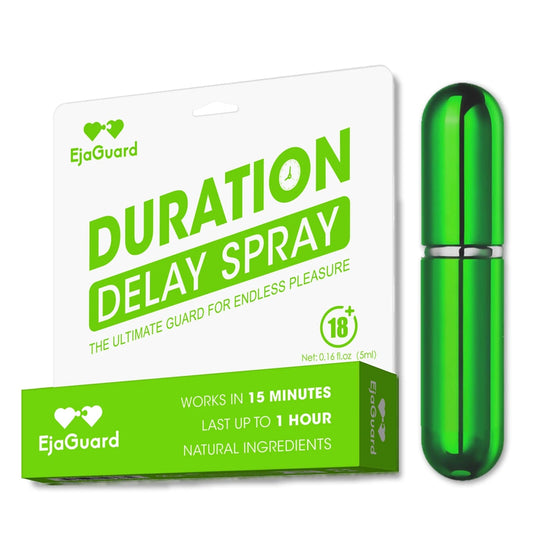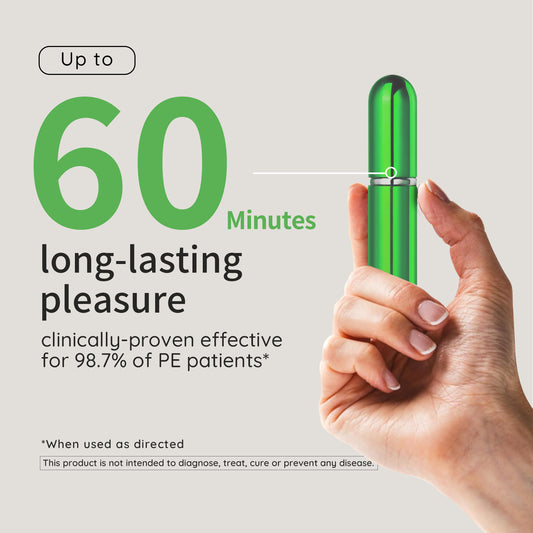From understanding causes, identifying symptoms, exploring treatments, and undergoing diagnosis to implementing prevention strategies, here's a comprehensive overview of premature ejaculation.

Premature ejaculation ranks among the common forms of male sexual dysfunction.
One in every three men will experience uncontrolled or rapid ejaculation at some point in their lives.
The inability to prolong sexual activity can lead to frustration and disappointment for both the man and his partner.
This guide offers an overview of premature ejaculation while delving into greater detail to explore its causes, symptoms, diagnosis, treatments, and prevention methods.
Continue reading to delve deeper and expand your understanding.
Diagnosis
What is premature ejaculation?
Premature ejaculation (PE) is a highly prevalent sexual dysfunction characterized by a man ejaculating within a short time frame (typically less than one minute) of engaging in vaginal intercourse, often without the ability to control the timing of ejaculation.
Premature ejaculation not only impacts sexual intercourse but can also lead to feelings of inadequacy, diminished confidence, and even shame or embarrassment.
How prevalent is premature ejaculation?
Premature ejaculation ranks as one of the most widespread male sexual disorders, impacting one out of every three men aged between 18 and 59.
According to research findings, men may encounter either natural variable premature ejaculation, characterized as "coincidental" or "situational" rapid ejaculation, or a premature-like ejaculation dysfunction when their symptoms persist with each sexual encounter.
Premature ejaculation can be manifest in two ways:
1.Lifelong premature ejaculation occurs when an individual has experienced symptoms for as long as they can remember.
2.Acquired premature ejaculation occurs when an individual suddenly develops symptoms of premature ejaculation later in life, after a period of normal sexual function.
What is the expected duration for a man before ejaculation?
Canadian and American sex therapists suggest that intercourse lasting between 3 to 13 minutes is considered "average".
Based on a compilation of surveys, sexual encounters lasting anywhere from 7 to 13 minutes are considered "desirable".
Causes
What causes premature ejaculation?
Sex experts posit that symptoms of premature ejaculation can arise from biological factors in men experiencing lifelong PE, while psychological factors may contribute to symptoms in men who develop them suddenly later in life.
Urologist Dr. Ira Sharlip emphasizes that being aware of symptoms is the first step toward prevention. No one should endure in silence, especially considering that, in most cases, premature ejaculation is a treatable sexual dysfunction.
Biological or Physical Factors
Men may experience genetic, biochemical, or a combination of these physical issues that can lead to premature ejaculation.
Some common physical factors contributing to premature ejaculation include:
- Abnormal hormone levels (such as testosterone)
- Imbalances in brain chemicals or neurotransmitters (for example, serotonin deficiency)
- Inflammation or infection of the prostate gland
- Medical conditions such as erectile dysfunction, thyroid disorders, chronic pelvic pain syndrome, and others.
Psychological or Emotional Factors
Conversely, symptoms of premature ejaculation may stem from various psychological or emotional factors.
The tension within a relationship is recognized to permeate into our intimate lives and can either trigger or exacerbate symptoms of premature ejaculation.
Dealing with emotional and mental stress from relationship issues can affect your ability to relax and focus during intimacy, leading to rushing to finish out of fear of losing your erection.
2. Struggling with Anxiety and Overthinking
Feeling anxious about your bedroom performance may lead to uncertainty and negative emotions around sex.
Ultimately, this can generate a self-sustaining loop of overthinking.
Most men may experience issues with orgasmic timing at some point in their lives, but stress during sex can make it happen repeatedly.
Sexual performance anxiety [link to 'Sexual Performance Anxiety' article] can lead to or exacerbate PE symptoms.
Nerves are common, especially during your first sexual encounter with a partner. Regaining ejaculatory control starts by getting out of your head.
3. Signs of Depression
Depression and male sexual function have a bi-directional relationship, with depression impairing sexual function in males. Conversely, poor sexual functioning can trigger feelings of depression.
Depression and male sexual function have a bi-directional relationship. Poor sexual functioning can trigger feelings of depression.
Note that many anti-depression medications may lead to additional sexual issues, such as erectile dysfunction.
Treatment
How can I treat premature ejaculation early?
If you're looking to cure your symptoms of premature ejaculation, you've come to the right place.
Here are some tips to help you improve your ejaculatory control for better, longer, more enjoyable sex!
1. Desensitizing Solutions
Increased penis sensitivity is a frequent trigger of premature ejaculation. Luckily, there are desensitizing remedies available!
A great desensitizing solution is the Delay Spray. Herbal-based sprays delay ejaculation by mildly numbing sensitive areas of the penis.
After conducting a recent randomized, single-blind, placebo-controlled study on EjaGuard ejaculation-delaying spray.
The study has this to say:
- Herbal-based delay spray led to a 59% increase in participants lasting over 2 minutes
- 53% of participants found their sexual life and relationship with their partner very satisfying
- During partnered intercourse, participants had a better sexual experience
2. Kegel Exercises
The pelvic floor is vital in controlling ejaculation. According to a study in Therapeutic Advances in Urology, pelvic floor exercises are highly effective for men with lifelong PE symptoms, helping them manage ejaculation reflexes and prolong climax.
Unlock the Power of Kegel Exercises for a Stronger Pelvic Floor.
3. Sex Positions
Don't let premature ejaculation hinder your sexual pleasure. Trying new positions and techniques can help enhance control and reduce sensitivity.
Low-sensitivity sex positions
Participating in sex can be another effective method to address symptoms of PE – as long as you approach it 'the right way'.
Key positions to reduce sensitivity during intimacy involve letting the woman take charge.
1) Cowgirl
The cowgirl position is great for reducing penis sensitivity during sex. Relax on your back and let your partner straddle you. By giving your partner control and avoiding intense movements, it may help delay ejaculation.
2) Seated Lap dance
An option where the woman takes control is the seated lap dance. While seated on a chair or bed edge, your partner lowers her hips onto your lap facing away. This keeps the focus on her pleasure rather than timing.
3) Spooning
The spooning position is a common pick for couples looking to keep things relaxed.
Both partners will lie on their sides like while cuddling. Partner separates legs, allowing entry from behind, focusing on grinding while stimulating clitoris.
4. The Squeeze Technique
The technique helps redirect blood flow in the penis and delay the ejaculatory response.
To accomplish this, you or your partner should gently press the top of your penis where the head meets the shaft for a few seconds before reaching climax. When executed properly, you may notice a quick decrease in sexual excitement.
5. Diet and Supplements
Nutrition and supplements are great tools for managing and preventing premature ejaculation.
Here are some foods to naturally treat premature ejaculation:
- Asparagus
- Avocados
- Dark chocolate
- Pork
- Chillies
- Carrots
- Ginger & Honey
- Bananas
Depending on your present diet, you might not receive sufficient nutrients from your daily meals. Thankfully, incorporating these vitamins and micronutrients can be beneficial!
- Zinc and magnesium boost testosterone, enhance libido, and support erections. Research suggests a daily intake of 11mg of zinc and magnesium.
- L-arginine is an amino acid that boosts blood flow to the penis, aiding in improving sexual function. The Journal of Sexual Medicine suggests a daily intake of 1,500-5,000mg of L-arginine.
- Ashwagandha is a natural herbal supplement that may reduce stress, balance hormone levels, and support ejaculatory control. Studies recommend a daily intake of 300-500 mg of Ashwagandha.
6. Prioritize Foreplay
Dr. Deb Laino, a sex and relationship expert, notes that anxiety can arise when men overly fixate on their penis. It's crucial to prioritize the entire body's experience with foreplay.
Various foreplay methods introduce different positions, toys, and sensations to enhance pleasure without focusing on orgasms.
For instance, try different sensations and stimulate erogenous zones with ice cubes, toys, or body parts, act out a shared sexual fantasy, or do a strip tease - all to increase arousal while delaying ejaculation.
7. Take a Break
Men dealing with porn-induced premature ejaculation may find it helpful to take a break from sexual activity.
Learn how NoFap can assist in managing porn or masturbation addiction and revitalizing your mind and body from sexually compulsive behaviors leading to premature ejaculation or other sexual dysfunction.
How to avoid premature ejaculation?
Understanding Premature Ejaculation: Prevention Is Key
Scientifically proven techniques to delay premature ejaculation Learn the Facts: Masturbation Myths Debunked
Masturbation can be both beneficial and detrimental to your sexual experiences.
Here are some helpful masturbation tips you can try:
- Boost Your Performance: Masturbate Before Intimacy to Delay Ejaculation
- Limit excessive consumption of porn and/or frequent masturbating
- Take your time during self-pleasure. Slow down and try the start and stop or pause techniques.
Let Go of Stress
If stress is a significant cause of early ejaculation, consider stress-relieving activities like exercising, meditation, journaling, or socializing for a healthier sex life.
Address Relationship Issues Early
When in doubt, talk it out!
Therapist Kate Moyle notes that when couples face challenges in their sexual relationships, they tend to distance themselves from the issue rather than confronting it.
Talking to your partner about relationship issues can help enhance sexual intimacy and result in normal ejaculation over time.
Professional assistance in managing PE
If your symptoms are severe, seeking medical advice might help with treatment and management options.
Recent studies show that a mix of medication and therapy could help reduce symptoms of PE, whether lifelong or acquired.
Psychotherapy
Relationship and sex expert Ammanda Major shares a high success rate for couples or individuals who participate in psychotherapy. Incorporating education, communication, and task exercises, nearly 93% of those in couples therapy noted betterment in their sex lives.
Behavioral therapy helps manage premature ejaculation symptoms by boosting self-confidence, reducing anxiety or depression, and enhancing sexual skills for longer-lasting orgasms.
Prescription Medication
For more severe cases of premature ejaculation, your family doctor might suggest prescription medication to help with and overcome the symptoms.
Consider using Selective serotonin reuptake inhibitors (SSRIs) like Lexapro, Zoloft, Paxil, and Prozac to help delay ejaculation.
Key Takeaways:
- Premature ejaculation (PE) occurs when a man ejaculates too quickly during sexual intercourse.
- A common cause of lifelong PE is a combination of physical and psychological factors.
- PE can be treated with various natural remedies including desensitizing sprays, kegel exercises, specific sex techniques, dietary changes, prolonged foreplay, and occasional breaks from intimacy.
- Early prevention of PE involves educating oneself on healthy masturbation techniques, managing stress, and addressing relationship issues promptly.
- A combination of sex therapy and drug therapy has shown effectiveness in delaying ejaculation.
FAQS
Is premature ejaculation synonymous with erectile dysfunction?
No, premature ejaculation concerns the duration until ejaculation, while erectile dysfunction involves difficulty achieving and sustaining an erection despite adequate stimulation. Nonetheless, strategies outlined below may benefit both conditions.
How is premature ejaculation diagnosed?
Primarily, self-awareness of ejaculating quickly and experiencing distress indicates premature ejaculation. Alternatively, seeking evaluation from a urologist is another option.
What is the typical duration for premature ejaculation?
The International Society for Sexual Medicine defines premature ejaculation as ejaculating within one minute of vaginal penetration.
What are the causes of premature ejaculation?
Various factors contribute to premature ejaculation, including hormonal imbalances, relationship issues, medical conditions, and mental health disorders.
Is premature ejaculation manageable?
Certainly. Effective approaches for managing premature ejaculation include utilizing lidocaine delay sprays and engaging in low-sensitivity sexual positions.
 Buy Now
Buy Now



